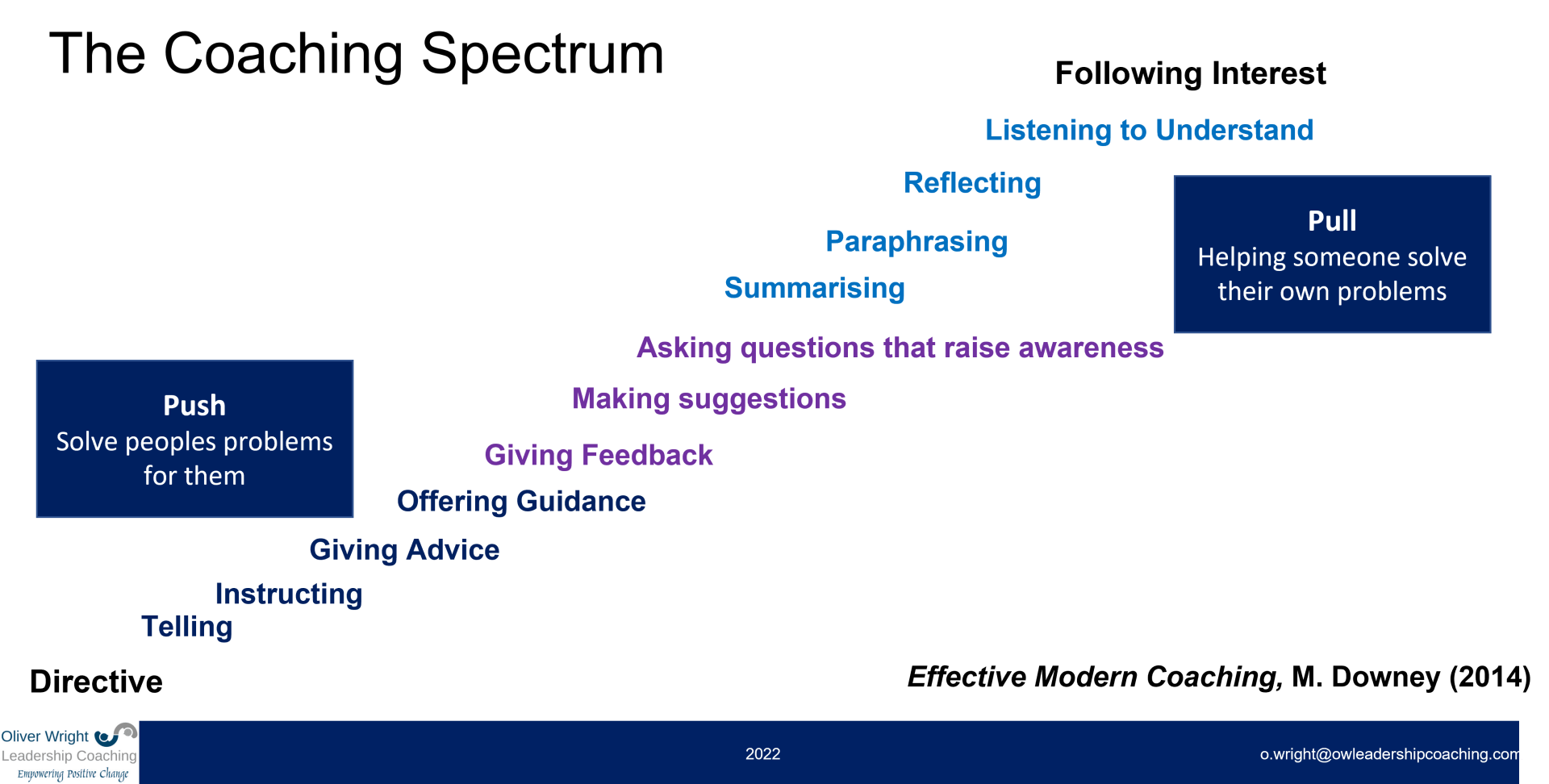Coaching or Mentoring for personal growth and development
Coaching or Mentoring?
There are coaches and mentors or those who offer both. So, what’s the difference?
Firstly, within the context of business or organisations the aim of both is broadly similar. That is, to help people in organisations develop the necessary self-awareness, emotional intelligence, and personal resilience to learn, build on their strengths and ultimately improve their performance.

Both coaching and mentoring can be defined as “learning relationships which help people to take charge of their own development, to release their potential and to achieve results” (Connor & Pokora, 2017, p.111 ).
Defining Coaching
The first thing to say is that there is no one universally agreed definition of coaching! Sir John Whitmore covers many key aspects in his definition and the CIPD add some useful elements.
I like to use a combination of elements that I believe capture the essence of coaching, as distinct from mentoring or other interventions such as training. The following definition works well for me:
Coaching aims to deliver optimal performance at work by empowering people through facilitation to acquire new knowledge, develop new skills and build new behaviours. It is goal orientated with a focus on setting objectives and identifying actions that deliver personal growth and improved performance. Coaching does not direct, teach or pass on specific knowledge but promotes self-discovery through self-directed learning, stimulated by the coach.
The key thing to take from this definition that distinguishes coaching is the fact that the coach does not direct, teach, or tell.
Defining Mentoring
Having reviewed a number of definitions this is a relatively narrow definition of mentoring in an organisation setting as distinct from coaching, and is often what informal mentoring looks like..
A professional guiding relationship between a more experienced or senior person and less experienced or younger person, focussed on imparting knowledge, giving advice, and providing direction to help them to acquire new knowledge, develop new skills and build new behaviours that deliver improved performance.
The key take out here is the fact that the mentor guides, directs, gives advice, and imparts knowledge, in contrast to the coach who facilitates and empowers the coachee to discover their own answers.
Coaching and Mentoring are by no means mutually exclusive activities and in fact European Mentoring and Coaching Council core competencies for professional coaches and mentors does not distinguish between them. But Mentors do add to the skills of coaching by using their relevant knowledge and experience more directly. Mentors are also more likely to be role models and sounding boards and may help the mentee more directly in answer questions and building networks. (Clutterbuck, 2020)
Another way to view coaching and mentoring is to see them as two ends of a spectrum, with professional mentors and coaches operating more closely together than at the extremes. Miles Downey (2014) has developed a useful spectrum to highlight the types of intervention that can be used in the practice of coaching and mentoring.
Coaching often aims to be more at the pull end of the spectrum, for more of the time and mentoring more at the push end in simple terms. In reality effective mentors need to use the skills present at the pull end of the spectrum and some coaches may well use their experience to guide and direct, with the permission of the coachee. But generally avoid giving advice, as do many mentors, still preferring to guide and facilitate their mentees to reaching their own decision and making their own choices.

What are the key differences between coaching and mentoring?
Both effective coaches and mentors should be using the skills at the pull end of this spectrum.
That is, they should be listening attentively and actively to understand what the other person is saying. They should also be reflecting back to ensure they clarify what the other person is saying and should be asking open questions to delve deeper into the subject to generate insight.
In reality the differences between coaching and mentoring can is blurred and it may be what people experience is a combination of the two in many instances. Some coaches may be more directive than others and some mentors may employ a lot of coaching techniques.
The main difference between coaching and mentoring, however, is in how the coach or mentor moves forward with their client or mentee once they have reached a level of understanding about the issues at hand and the clients objectives.
The mentor will look to offer guidance, and wisdom using their knowledge and expertise to offer suggestions and even solutions, although they should leave room for the decision to be the mentees. The coach, however, will use further questioning, listening and reflection to facilitate the coachee to find their own answers and empower them to determine their course of action and find solutions.
Formal vs. Informal
Another difference is that coaching in organisations tends to be more formal and time bound, with a coach being brought in for an allotted amount of time to help the coachee develop and take specific action towards achieving their objectives.
Mentoring, although not always, is often more informal, the relationship may last for months or years and can be on and off depending on need. Mentoring, because it is less focussed can be appropriate for more informal chats and catch ups, where valuable insight and knowledge may be imparted. Coaching sessions however are always scheduled and tend to take place in more formal settings.
Although it should be noted that the atmosphere in a good coaching session is a relaxed one and the effective coach creates a safe environment where the coachee feels very comfortable.
The level of specific industry, functional or subject knowledge required varies between coach and mentor.
In order to offer advice, guidance and suggestions a mentor will need to have sufficient relevant knowledge and experience. Whereas a coachee is facilitated by the coach to discover things for themselves through self-directed learning, stimulated by the coach. This means the coach does not need to come armed with specific industry or functional knowledge.
Sir John Whitmore (a performance coach) famously taught a golf swing to a novice golfer without giving any specific instructions on the swing or imparting any knowledge about golf. The result was that the novice golfers swing was at least as effective as the swing of another novice who had been mentored by a golf professional (who was instructing, advising and teaching based on detailed knowledge and experience of golf). (248) Sir John Whitmore demonstrates coaching vs instruction - YouTube
Coach or Mentor?
Given the definitions discussed here there may not be a big difference between the two in reality, but assuming that the coach and mentor are operating at different ends of the spectrum, albeit both using listening, reflection and questioning, there is definitely a need for both and in the modern organisation with the wide array of challenges faced by business and other entities in today's increasingly volatile and uncertain world.
Having a seasoned operator or subject specific expert on hand to act as a trusted advisor and mentor can be very helpful for leaders and others to lean on, either regularly or on an ad hoc basis. Increasing their knowledge base and giving them a sounding board for ideas and decision making.
Likewise working with a coach to make sense of everything that is happening, to help define strategic objectives and to help increase self awareness can bring real benefits to leaders and their organisations.
Gaining insight to grow personal understanding, develop effective interpersonal behaviours and optimise your ability to meet challenges creatively, as well as focusing on specific objectives, is where coaching can add real value.
Coaching can help teams also. Team coaching is becoming increasingly popular as teams and team leaders look to create the best possible circumstances for the teams to thrive and to maximise their potential. Coaching is ideally suited to help with the critically important interpersonal dynamic in a team, which helps build a culture of support and psychological safety, the most important factor in determining high performance. As David Clutterbuck (2020) says,
"...team coaching promotes the social dialogue that builds rapport, stimulates understanding of self and other team members, and develops the skills to avoid negative conflict and enhance positive conflict within the team."
References:
Connor, M., & Pokora, J. (2017). Coaching and mentoring at work: developing effective practice. London, England: Open University Press/McGraw-Hill Education
Whitmore, J. (2017). Coaching for Performance. 5th ed, Nicholas Brealey Publishing.
Peterson, D. (2011). Executive coaching: A critical review and recommendations for advancing the practice. 10.1037/12170-018. www.researchgate.net/publication/232527868
CIPD (2020) Coaching and Mentoring Factsheet. On the CIPD website www.cipd.co.uk/knowledge/fundamentals/people/development/coaching-mentoring-factsheet#gref
Clutterbuck, D (2020). Coaching The Team at Work. 2nd Edition. Nicholas Brealey Publishing.
Ganesh, A. Bozas, A. Subban, M. Munapo M. (2015) THE BENEFITS OF MENTORING AND COACHING IN THE PUBLIC SECTOR. Journal of Governance and Regulation. Volume 4, Issue 3, 2015






